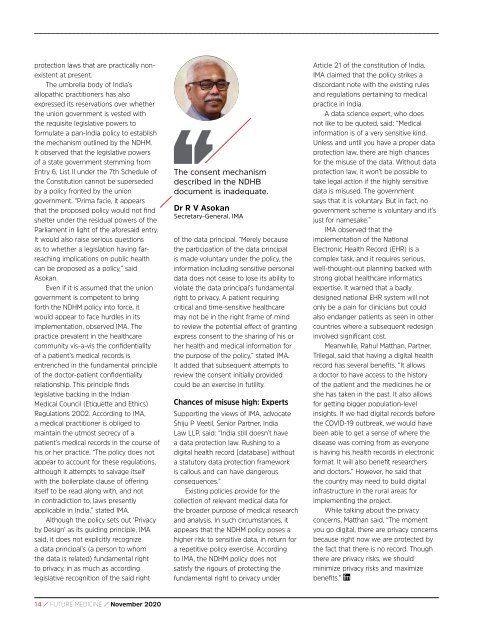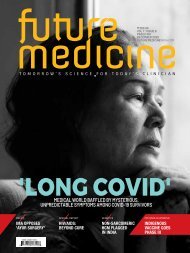FM November2020 Digital P
You also want an ePaper? Increase the reach of your titles
YUMPU automatically turns print PDFs into web optimized ePapers that Google loves.
protection laws that are practically nonexistent<br />
at present.<br />
The umbrella body of India’s<br />
allopathic practitioners has also<br />
expressed its reservations over whether<br />
the union government is vested with<br />
the requisite legislative powers to<br />
formulate a pan-India policy to establish<br />
the mechanism outlined by the NDHM.<br />
It observed that the legislative powers<br />
of a state government stemming from<br />
Entry 6, List II under the 7th Schedule of<br />
the Constitution cannot be superseded<br />
by a policy fronted by the union<br />
government. “Prima facie, it appears<br />
that the proposed policy would not find<br />
shelter under the residual powers of the<br />
Parliament in light of the aforesaid entry.<br />
It would also raise serious questions<br />
as to whether a legislation having farreaching<br />
implications on public health<br />
can be proposed as a policy,” said<br />
Asokan.<br />
Even if it is assumed that the union<br />
government is competent to bring<br />
forth the NDHM policy into force, it<br />
would appear to face hurdles in its<br />
implementation, observed IMA. The<br />
practice prevalent in the healthcare<br />
community vis-a-vis the confidentiality<br />
of a patient’s medical records is<br />
entrenched in the fundamental principle<br />
of the doctor-patient confidentiality<br />
relationship. This principle finds<br />
legislative backing in the Indian<br />
Medical Council (Etiquette and Ethics)<br />
Regulations 2002. According to IMA,<br />
a medical practitioner is obliged to<br />
maintain the utmost secrecy of a<br />
patient’s medical records in the course of<br />
his or her practice. “The policy does not<br />
appear to account for these regulations,<br />
although it attempts to salvage itself<br />
with the boilerplate clause of offering<br />
itself to be read along with, and not<br />
in contradiction to, laws presently<br />
applicable in India,” stated IMA.<br />
Although the policy sets out ‘Privacy<br />
by Design’ as its guiding principle, IMA<br />
said, it does not explicitly recognize<br />
a data principal’s (a person to whom<br />
the data is related) fundamental right<br />
to privacy, in as much as according<br />
legislative recognition of the said right<br />
The consent mechanism<br />
described in the NDHB<br />
document is inadequate.<br />
Dr R V Asokan<br />
Secretary-General, IMA<br />
of the data principal. “Merely because<br />
the participation of the data principal<br />
is made voluntary under the policy, the<br />
information including sensitive personal<br />
data does not cease to lose its ability to<br />
violate the data principal’s fundamental<br />
right to privacy. A patient requiring<br />
critical and time-sensitive healthcare<br />
may not be in the right frame of mind<br />
to review the potential effect of granting<br />
express consent to the sharing of his or<br />
her health and medical information for<br />
the purpose of the policy,” stated IMA.<br />
It added that subsequent attempts to<br />
review the consent initially provided<br />
could be an exercise in futility.<br />
Chances of misuse high: Experts<br />
Supporting the views of IMA, advocate<br />
Shiju P Veetil, Senior Partner, India<br />
Law LLP, said: “India still doesn’t have<br />
a data protection law. Rushing to a<br />
digital health record [database] without<br />
a statutory data protection framework<br />
is callous and can have dangerous<br />
consequences.”<br />
Existing policies provide for the<br />
collection of relevant medical data for<br />
the broader purpose of medical research<br />
and analysis. In such circumstances, it<br />
appears that the NDHM policy poses a<br />
higher risk to sensitive data, in return for<br />
a repetitive policy exercise. According<br />
to IMA, the NDHM policy does not<br />
satisfy the rigours of protecting the<br />
fundamental right to privacy under<br />
Article 21 of the constitution of India.<br />
IMA claimed that the policy strikes a<br />
discordant note with the existing rules<br />
and regulations pertaining to medical<br />
practice in India.<br />
A data science expert, who does<br />
not like to be quoted, said: “Medical<br />
information is of a very sensitive kind.<br />
Unless and until you have a proper data<br />
protection law, there are high chances<br />
for the misuse of the data. Without data<br />
protection law, it won’t be possible to<br />
take legal action if the highly sensitive<br />
data is misused. The government<br />
says that it is voluntary. But in fact, no<br />
government scheme is voluntary and it’s<br />
just for namesake.”<br />
IMA observed that the<br />
implementation of the National<br />
Electronic Health Record (EHR) is a<br />
complex task, and it requires serious,<br />
well-thought-out planning backed with<br />
strong global healthcare informatics<br />
expertise. It warned that a badly<br />
designed national EHR system will not<br />
only be a pain for clinicians but could<br />
also endanger patients as seen in other<br />
countries where a subsequent redesign<br />
involved significant cost.<br />
Meanwhile, Rahul Matthan, Partner,<br />
Trilegal, said that having a digital health<br />
record has several benefits. “It allows<br />
a doctor to have access to the history<br />
of the patient and the medicines he or<br />
she has taken in the past. It also allows<br />
for getting bigger population-level<br />
insights. If we had digital records before<br />
the COVID-19 outbreak, we would have<br />
been able to get a sense of where the<br />
disease was coming from as everyone<br />
is having his health records in electronic<br />
format. It will also benefit researchers<br />
and doctors.” However, he said that<br />
the country may need to build digital<br />
infrastructure in the rural areas for<br />
implementing the project.<br />
While talking about the privacy<br />
concerns, Matthan said, “The moment<br />
you go digital, there are privacy concerns<br />
because right now we are protected by<br />
the fact that there is no record. Though<br />
there are privacy risks, we should<br />
minimize privacy risks and maximize<br />
benefits.”<br />
14 / FUTURE MEDICINE / November 2020

















